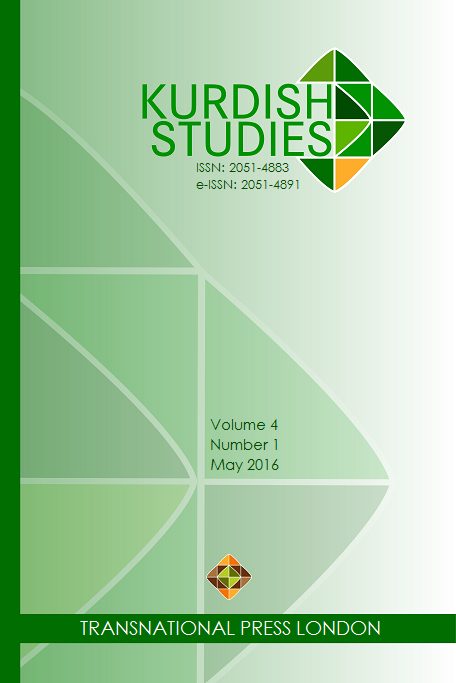Kurdish Studies
Kurdish Studies
Publishing House: Transnational Press London
Subject(s): Politics / Political Sciences, History, Social Sciences, Language and Literature Studies, Economy, Law, Constitution, Jurisprudence, Fine Arts / Performing Arts, Geography, Regional studies, Theology and Religion
Frequency: 2 issues
Print ISSN: 2051-4883
Online-ISSN: 2051-4891
Status: Ceased Publication
- 2013
- 2014
- 2015
- 2016
- 2017
- 2018
- 2019
- 2020
- 2021
- 2022
- Issue No. 1/1
- Issue No. 1/2
- Issue No. 2/2
- Issue No. 1/3
- Issue No. 2/3
- Issue No. 1/4
- Issue No. 2/4
- Issue No. 1/5
- Issue No. 2/5
- Issue No. 1/6
- Issue No. 2/6
- Issue No. 1/7
- Issue No. 2/7
- Issue No. 1/8
- Issue No. 2/8
- Issue No. 1/9
- Issue No. 2/9
- Issue No. 1/10
Articles list
{{ article.TitleOriginalLanguage }}
{{ article.TitleOriginalLanguage }}
({{ article.TitleEnglish }})
- Publication: {{ article.Publisher }} ({{ article.Issue }})
- Author(s): {{ article.Authors }}
- Contributor(s): {{ article.Contributors }}
- Language: {{ article.Language }}
- Subject(s): {{ article.Subjects }}
- Issue: {{ article.Issue }}
- Page Range: {{ article.PageRange }}
- No. of Pages: {{ article.NumberOfPages }}
- Keywords: {{ article.Keywords }}
- Summary/Abstract: {{ article.SummaryAbstract }}
- Price: {{ common.currency(article.Price) }}
Short Description
Kurdish Studies journal is an interdisciplinary and peer-reviewed journal dedicated to publishing high quality research and scholarship. Kurdish Studies journal is initiated by the members of the Kurdish Studies Network (KSN) and supported by a large group of academics from different disciplines. The journal aligns itself with KSN's mission to revitalize and reorient research, scholarship and debates in the field of Kurdish studies in a multidisciplinary fashion covering a wide range of topics including, but not limited to, economics, history, society, gender, minorities, politics, health, law, environment, language, media, culture, arts, and education.
Kurdish Studies offers a universally accessible venue where sound scholarship and research as well as reviews and debates are disseminated. The journal establishes a genuine forum for serious discussion and exchange within the Kurdish Studies community, reaching out to a broad audience of students, professionals, policy makers and enthusiasts alike. Kurdish Studies aims to maintain a fair balance between theoretical analyses and empirical studies. Critical and novel approaches and methods are particularly welcome.

